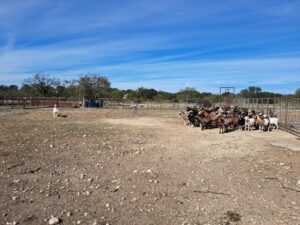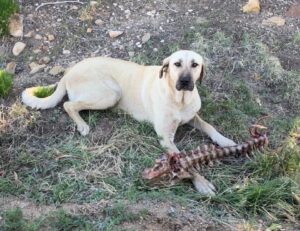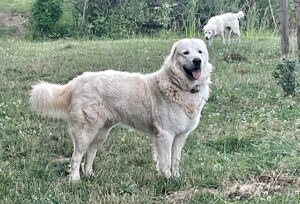Hunting season is underway, and reminding hunters that LGDs are in use on your ranches is essential. Frequent reminders to your hunters to not feed or socialize with your LGDs will help keep conflicts to a minimum. Move LGDs to other pastures that hunters may not use or kennel the dogs on weekends when possible. Your dogs could use the rest and extra food in the winter months ahead.
Reminding hunters to clean deer and leave carcasses in designated areas also helps keep the dogs away from the hunter’s trailers. Properly securing trash and keeping clean campsites will also keep the dogs from interacting with your hunters. I am currently working on a factsheet about using LGDs with hunting leases that should be ready before next fall. Keep an eye out for it on our website!
The AgriLife Center in San Angelo will be closed for the holiday break from Dec. 25 thru Jan. 1. I hope everyone has a Merry Christmas and a Happy New Year’s holiday!
AgriLife Livestock Guardian Dog Program: Update and Events
Our next online seminar will be on Feb. 15 at 3 pm. The online workshop will be on the Maremma Breed and will be presented by long-time
breeder Sarah Letts, owner of Sky Island Farm LLC in California. Sarah is a past board president of the Maremma Sheep Dog Club of America and will discuss the distinct types of Maremma dogs and their characteristics in the online seminar. Check out the events page on our Facebook page for more information and to register for the event. You can also register for the online workshop on our website.
The Texas LGD Association (TLGDA) has added a Facebook Group Page so that producers can access help and information directly from the membership. Members will also be able to post advertisements for pups and dogs directly instead of having to submit the information to board members. The group page is currently open to anyone interested in LGDs but will become a member-only resource in the future. Now is the time to join the association to ensure you can access breeders and resources from the organization on Facebook and their website!
The TLGDA is also adding five directors at large to increase awareness of the association at livestock and agriculture events across the state. If you are a member of the association and are interested in taking on a leadership role, please contact one of the board members or myself.
Does the sex of an LGD influence guarding ability?
Producers often ask whether to choose a male or female dog to guard their livestock. Anecdotal evidence suggests that males are more aggressive towards predators, and females stay closer to the herds. In a 2017 study, Dr. Julie Young found no difference in the guarding ability of males vs females or between intact and fixed dogs. A producer survey done in 1988 of over 940 ranchers by Dr. Green and Dr. Woodruf also showed no differences in LGD guarding abilities. A study done in 2015 by Dr. Stacey-Lee Leijenaar in South Africa also showed no differences in guarding abilities between male and female dogs. The study indicated that intact male dogs tended to roam and leave stock unguarded. A study performed in 2005 by Dr. James Serpell using the Canine Behavioral Assessment and Research Questionnaire (C-BARQ©) showed no differences in trainability between fixed and intact dogs. Only two breeds of the eleven tested showed slight statistical differences between the trainability of males and females. However, no specific LGD breeds were evaluated in the study.
These studies may not be directly comparable to your operation; neither those studies nor our own research has shown any major differences in guarding abilities between males and females. All pups in our project are fixed before they are placed on ranches to alleviate roaming and unwanted litters of puppies. Producer interviews have shown that intact males roam more, are aggressive towards other LGDs, and tend to resource guard more often. The articles cited above tend to agree with these findings as well. Fixed dogs tend to live longer and stay on the job more because they are not preoccupied with mating or caring for a litter of pups. Hopefully, this information will help producers make a more informed decision when picking a male or female pup as a future LGD for their operation.
Bonding Project Update
Round Five Dogs

Smith and Wesson meet their new livestock at a ranch in Sonora. AgriLife picture courtesy of Costanzo, 2023
Six of the eight pups from round five of the project were placed with cooperating producers in late November. So far, all the pups are doing well at their new ranches and are adjusting to their new livestock. We will track each pup with Oyster 3 cellular GPS trackers until they are 18 months of age. We will keep track of any roaming that may occur at the ranches. Make sure to follow our Facebook page for updates on the pups as they begin to mature over the next 10 months.
Round Six
We plan to start round six of the bonding project in early 2024. We didn’t receive funding to test different methods to train pups to be more attentive to aerial predator threats. Our contingency plan is to test levels of socialization and potentially include deer in boding pen to reduce conflicts with deer hunting operations. We will look at different amounts of socialization of the dogs to attempt to determine the least amount of time required during bonding to train a puppy and still achieve a catchable adult dog in the field. We are currently looking for three Karakachan pups and three other pups for that round of the project. If you have a litter of pups we could purchase during that period, feel free to reach out.
In closing
If you enjoyed this monthly LGD blog, please don’t forget to subscribe to it with this link: The Guardian Way | Texas A&M AgriLife Research and Extension Center at San Angelo.
To provide feedback on this article or request topics for future articles, please contact me at bill.costanzo@ag.tamu.edu or 325-657-7311.
The Texas A&M AgriLife Livestock Guardian Dog Program is a cooperative effort by Texas A&M AgriLife Research and the Texas Sheep and Goat Predator Management Board. Follow us on our social media sites and share them with your friends and family!
Facebook, Instagram, YouTube: @TAMUlivestockguarddog
 Do not forget to check out the Texas LGD Association online! Follow the organization on Facebook or YouTube at @TexasLGDAssociation or check out their website!
Do not forget to check out the Texas LGD Association online! Follow the organization on Facebook or YouTube at @TexasLGDAssociation or check out their website!






